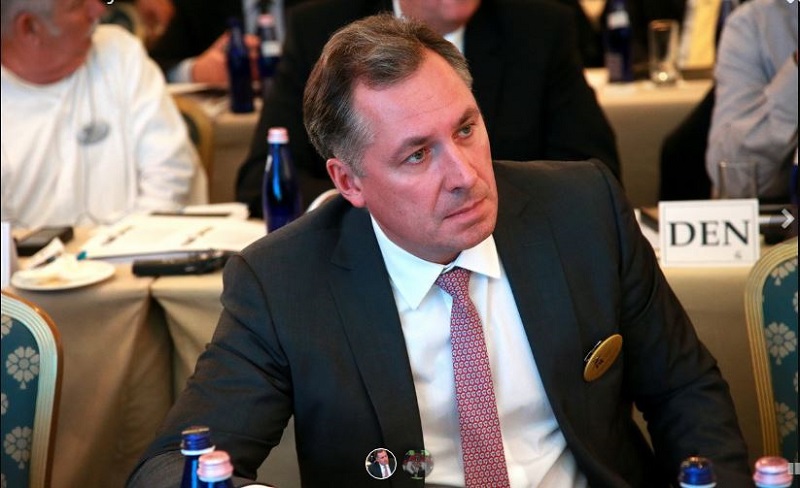
Stanislav Pozdnyakov has been elected President of the Russian Olympic Committee (ROC) after defeating Alexander Popov in today’s election.
Pozdnyakov, the current first vice-president of the ROC and who headed the neutral Olympic Athletes from Russia team at this year’s Winter Olympic Games in Pyeongchang, received 214 votes for 78.7 per cent of the total.
Popov recieved 56 votes for 20.6 per cent in the race to replace Alexander Zhukov.
Pozdnyakov, 44, is also a four-time Olympic and 10-time world champion in fencing.
He had always been heavily favoured against an opponent who won four Olympic gold medals in sprint freestyle swimming.
Ensuring full Russian participation at the Tokyo Olympics following the doping scandal which dominated Zhukov’s tenure was hailed as a priority.
“The Olympic Assembly decided to give me the powers of the president of the Russian Olympic Committee for a four-year term,” Pozdnyakov said afterwards, according to Sport Express.
“I realise that we have a very big and serious work to do.
“We have work to improve the management of sports, to raise the prestige of Russia on the international sports arena.”
Igor Levitin, an aide to Russian President Vladimir Putin who met with International Olympic Committee (IOC) President Thomas Bach during Pyeongchang 2018, was elected into the vacant first vice-president position.
Gennady Timchenko and Vladimir Kozhin, President of the Russian Association of Winter Olympic Sports, will also continue as vice-presidents.
They will be joined by two new vice-presidents in Russian Gymnastics Federation President Vasily TItov and Modern Pentathlon Federation of Russia counterpart Viacheslav Aminov.
Russian steel tycoon Vladimir Lisin will vacate his position after announcing plans to stand for the International Shooting Sport Federation Presidency earlier this month.
Vladimir Sengleev and five-time Olympic synchronised swimming champion Anastasia Davydova were re-appointed to the respective posts of director general and general secretary.
Pozdnyakov was considered a consensus candidate and the favourite of the IOC.
“Among the main tasks of the sports and organisational activities of the ROC, it is necessary to highlight the increase in the effectiveness of interaction with the Ministry of Sport and the All-Russian Sports Federations (OCF),” he said before the election today, according to TASS, Russia’s official state news agency.
“We must finally ensure that the main integrated programme for the main document regulating the preparation of the national teams for the Winter and Summer Games indicates in it all the activities that the OCF implements independently and/or at the expense of the means of the Ministry of Sport and the ROC.
“The ROC should actively participate in the development and in this regard, it is proposed to improve the existing three-level system of managing the preparations for the Olympic Games.”
Russian Sports Minister Pavel Kolobkov, another former fencer, was among those to congratulate Pozdnyakov following his election.
Popov, meanwhile, an IOC Athletes’ Commission member until 2016, lashed out at the structure of ROC, as well as its duties, perspective and goals and called for it to have more power.
This provoked a response from Zhukov, insidethegames understands, who said it was not honest and fair for a candidate to say such things.
Zhukov announced in October that he would step down to concentrate on his work in the country’s Parliament.
His departure means he will automatically lose his IOC membership.
He is also expected to resign as chair of the Beijing 2022 Coordination Commission.
Russian President Putin delivered a special message before the election today.
“Today, the Olympic Movement of Russia faces serious and highly responsible tasks,” he said.
“The future of sports of higher achievements and its competitiveness largely depend on their competent decisions.
“It is important to fully ensure the restoration of our positions in the international sports movement, actively participate in the activities of international federations, continue to work on improving the effectiveness of the anti-doping system.
“And of course, it is necessary to give priority to the formation of a culture of absolute intolerance to this negative phenomenon at all stages of sports training.
“I want to emphasise that the responsibility for achieving these goals rests with the ROC as the founder of the all-Russian anti-doping organisation.
“I am confident that together we will overcome all difficulties together and continue developing Russian sports for the benefit of the fatherland and its citizens.”






























